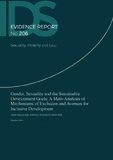| dc.identifier.citation | Majeedullah, A.; Wied, K. and Mills, E. (2016) Gender, Sexuality and the Sustainable Development Goals: A Meta-Analysis of Mechanisms of Exclusion and Avenues for Inclusive Development, IDS Evidence Report 206, Brighton: IDS | en |
| dc.description.abstract | Through its work, the Institute of Development Studies Sexuality, Poverty and Law programme (SPLP) provides new evidence-based knowledge and policy options that support efforts to: (1) strengthen, through legal reform, the rights of lesbian, gay, bisexual and transgender (LGBT) people and those marginalised because of their gender identity and sexuality; and (2) support LGBT people and those marginalised because of their sexuality to establish sustainable livelihoods. This in turn supports the production of risk-sensitive, practical approaches that can be implemented to achieve legal reform and tackle poverty among people marginalised due to their sexuality.
To date, the SPLP has produced over 40 policy and research publications, two toolkits and one interactive map. Of these resources, the programme has worked with local and national activists and academics to generate 18 empirical studies to document the impact of discriminatory laws and policies on the lives and livelihoods of people marginalised on the basis of their gender identity and/or sexuality. These studies include five policy audits, six poverty case studies and seven legal case studies, and they draw on original research in South Africa, Rwanda, Ethiopia, Egypt, Brazil, India, Nepal, Vietnam, the Philippines, Cambodia, Pakistan and Lebanon. This report is based on a meta-analysis of the 18 empirical studies. Through this analysis, we traced the programme’s overarching findings against the Sustainable Development Goals (SDGs).
While global leaders maintain their commitment to the post-2015 vision of more inclusive development and the dissolution of inequalities, the work conducted by the SPLP calls attention to context-specific experiences of persons whose sexual orientation or gender identity and expression (SOGIE) does not conform to societal norms, rendering them vulnerable to various dimensions of exclusion from development policies and resources. To highlight the importance of integrating diverse SOGIE representation within the SDGs, this report presents seven main themes that emerge from the SPLP data and maps these findings onto the contemporary SDG framework. Correlations between global development areas, national, context-specific policies and laws, and various facets of everyday discrimination conducted against persons with non-conforming SOGIE are examined in this report. | en |


